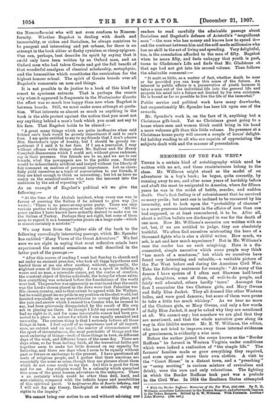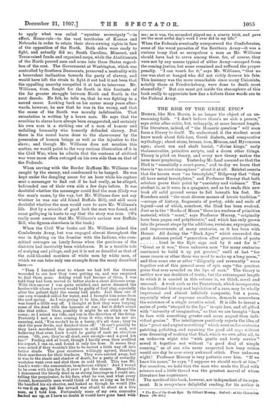MEMORIES OF THE FAR WEST.* THERE is a certain kind
of autobiography which need be written with no art, and these reminiscences belong to the class. Mr. Williams might stand as the model of an adventurer in a boy's book ; he began, quite correctly, by running away to sea, and after some years of hardship before and abaft the mast he emigrated to America, where for fifteen years. he was in the midst of battle, murder, and sudden death. One's first feeling is of astonishment that he survived so many perils ; but next one is inclined to be reassured by his immunity, and to look upon the "probability of chances" as a more generous instrument in the affairs of "men than one had supposed, or at least remembered, it to be. After all, about a million bullets are discharged in war for the death of one man. Now Mr. Williams's memoirs are written with no art, but, if we are entitled to judge, they are absolutely truthful. We often find ourselves mistrusting the hero of a thousand fights who is also a skilful writer. How much, we ask, is art and bow much experience But in Mr. Williams's case the reader has no such misgiving. Here is a dis- connected, simple narrative which some people may think "too much of a muchness," but which we ourselves have found very interesting and valuable,—a veritable picture of the Far West before and during the American Civil War. Take the following sentences for example: "At many of the dances I have spoken of I often met Shawnee half-breed girls, daughters, some of them, of well-to-do people, and fairly well educated, others hardly tame.' Amongst the first I remember the two Choteau girls, and Mary Owens and Sally Blue Jacket. They all dressed like other Western belles, and were good dancers ; but some of them were prone to take a little too much whiskey." As we hear no more of the Choteau girls, or Mary Owens, and only a few words of Sally Blue Jacket, it may be asked why they are mentioned at all. We cannot say ; but somehow we are glad that they are mentioned, and that the whole narrative goes along its way in this lifelike manner. Mr. E. W. Williams, the editor, who has not tried to improve away these internal evidences of genuineness, is evidently a wise man.
Before the author joined the corps known as the "Border Ruffians" he farmed in Western Virginia under conditions which were indeed a realisation of "the simple life." The farmers' families made or grew everything they required, and even spun and wove their own clothes. A visit to the " Court House" in a distant town, and a "preaching" or "camp meeting" (a curious mixture of revivalism and drink), were the rare and only relaxations. The fighting in which the Border Ruffians took part was a prelude to the Civil War. In 1854 the Southern States attempted • With the Border Wane: Memories of the Far West, 1882-1868. Hy R. H. Williams, sometime Lieutenant in the Kansas Bangers, and afterwards Captain in the Texan Rangers. Edited by E. W. Williams. With Portraits. London John Murray. [12s. net.]
to apply what was called " squatter sovereignty "—in effect, Home-rule—to the vast territories of Kansas and Nebraska in order to retain their slave-owning rights in face of the opposition of the North. Both sides were ready to fight, and actually did so; South Carolina, Missouri, and Texas raised funds and organised corps, while the Abolitionists
of the North poured men and arms into these States regard- less of the cost. The Government at Washington, which was controlled by Southern Democrats, preserved a neutrality with a benevolent inclination towards the party of slavery, and would have left the rivals to fight it out had it not been that the appalling anarchy compelled it at last to intervene. Mr. Williams, then, fought for the South in this foretaste of the far greater struggle between North and South in the
next decade. He felt, he tells us, that he was fighting in a sacred cause. Looking back on his career many years after- wards, however, he saw that he was in the wrong, and that the cause of the South was morally indefensible. That recantation is written by a brave man. He says that the cruelties to slaves have always been exaggerated, and certainly his own case is a striking one of a man of honour and unfailing humanity who honestly defended slavery. But there is the moral harm done to the slave-owner by the possession of human beings as well as the injustice to the slave ; and though Mr. Williams does not mention this matter, we would point to the very curious illustration of it in the Civil War, when he admits that the customs of civilised war were more often outraged on his own side than on that of the Federals.
When serving with the Border Ruffians Mr. Williams was caught by the enemy, and condemned to be hanged. He was kept under the dangling noose for an hour while his captors sent a messenger to find out if he had really, as he alleged, befriended one of their own side a few days before. It was doubtful whether the messenger could find the man (Cody was the man's name, by the way, but Mr. Williams does not say whether he was our old friend Buffalo Bill), and still more doubtful whether the man would care to save Mr. Williams's life. But by a miracle of good luck the man was found, and
came galloping in haste to say that the story was true. ( We really must assume that Mr. Williams's saviour was Buffalo Bill, who figures elsewhere in the book.)
When the Civil War broke out Mr. Williams joined the Confederate Army, but was engaged almost throughout the war in fighting on the frontier with the Indians, who com- mitted outrages on lonely farms when the garrisons of the districts had inevitably been withdrawn. It is a terrible tale of scalping and pillage, and yet it is not so dreadful as that of the cold-blooded murders of white men by white men, of which we can take only one example from the many described here :—
" Then I hurried over to where we had left the German wounded to see how they were getting on, and was surprised to find them gone. Asking what had become of them, I was told they had been moved to better shade a short distance away. With this answer I was quite satisfied, and never dreamed the brutes with whom I served would be guilty of foul play, especially after the gallant fight the enemy had made. Just then one of our own wounded called for water, and I brought him some from the cool spring. As I was giving it to him, the sound of firing was heard a little way off. I thought at first they were burying some of the dead with the honours of war ; but it didn't sound like that either. Then, possibly it might be an attack on the camp; so I seized my rifle, and ran in the direction of the firing. Presently I met a man coming from it who, when he saw me running, said, You needn't be in a hurry, it's all done ; they've shot the poor devils, and finished them off.' It can't possibly be they have murdered the prisoners in cold blood !' I said, not believing that even Luck would be guilty of such an atrocious crime. 'Oh, yes; they're all dead, sure enough—and a good job too !' Feeling sick at heart, though I hardly even then credited his report, I ran on, and found it only too true. It seems they were asked if they wouldn't like to be moved a little way off into better shade. The poor creatures willingly agreed, thanking their murderers for their kindness. They were carried away, but it was to the shade and shadow of death, for a party of cowardly wretches went over and shot them in cold blood. This was Mr. Luck's work—the remorseless, treacherous villain ! And I vowed to be even with him for it, if ever I got the chance. Meanwhile I denounced the bloody deed in as strong language as I could use, telling the perpetrator, to his face, what he was, and what every decent, honourable man would think of him as long as he lived. He handled his six-shooter, and looked as though he would like to use it on me; but the coward was afraid to shoot at a live inan, as I told him. Fortunately some of my own comrades backed me up, or I have no doubt it would have gone hard with me; as it was, the scoundrel played me a scurvy trick, and gave me the most awful day's work I ever did in my life."
When the Federals eventually overpowered the Confederates, some of the worst parasites of the Southern Army—it was a curious irony that so scrupulous a man as Mr. Williams should have had to serve among these, for, of course, they were not by any means typical of either Army—escaped from the coming justice, but some remained and suffered the proper penalty. "I can vouch for it," says Mr. Williams, " that no one was shot or hanged who did not richly deserve his fate. This leniency was the more remarkable since many Unionists, notably those at Friedricksburg, were done to death most shamefully." But one must get inside the atmosphere of this book really to appreciate how fine a tribute these words are to the Federal Army.















































 Previous page
Previous page